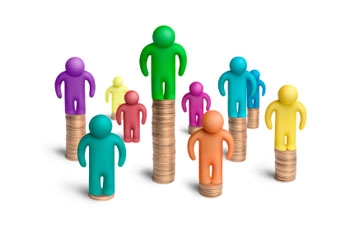You Can’t Buy Empathy
“It’s not what you know but who you know,” the saying goes, suggesting that social connections breed success.
But it seems there’s at least one way that the rich are less socially connected: New research finds that upper class people have more trouble reading others’ emotions.

In a series of studies, researchers examined how well participants could judge the emotions that other people were feeling, a skill known as “empathic accuracy.” In each study, the researchers (including the GGSC’s Dacher Keltner) compared the empathic accuracy of people of higher and lower socioeconomic status (SES).
In one study, they showed 200 adults photos of faces expressing different emotions, finding that people with just a high school education identified the emotions more accurately than people who had a four-year college degree. (Education is commonly used to indicate socioeconomic status.)
In another study, the researchers had two college students participate in a group job interview; afterwards, they asked each student to gauge what the other had been feeling during the exchange. Among the 106 students involved, those who had reported that their family was of lower SES (relative to their school’s entire student population) were more likely to read the other person’s emotions correctly.
Describing their results in Psychological Science, the researchers argue that these discrepancies reflect the different ways higher and lower class people solve their problems in life. Because lower-class people can’t draw as much on social power or financial resources, they must instead rely on help from others, making them more sensitive to the social and emotional cues they get from those around them.
“If that’s your strategy,” says Michael Kraus, a post-doctoral fellow at the University of California, San Francisco, and the lead author of the study, “you need to be better at reading others’ emotions—for instance, by perceiving threats and understanding when others are angry, or by noticing when other people are happy, since that may signal opportunities that are few and far between.”
Indeed, in prior research he conducted with Keltner, Kraus found that people of lower socioeconomic status appeared more engaged in conversations than did people of higher SES—for instance, they were less likely to doodle and more likely to nod their heads or laugh in response to something their partner said. Related research, also co-authored by Kraus and Keltner, shows that people of lower SES are more likely to give money to a stranger as well.
But does their lofty status really cause upper class people to ignore others’ emotions, or are they innately less emotionally intelligent—perhaps they even get further in life because they’re less concerned about other people’s needs?
The researchers addressed this question in a final study described in their Psychological Science paper. They manipulated people’s sense of status, making participants feel higher or lower on the social ladder.
Regardless of their actual SES, people temporarily made to feel lower class were better able to discern others’ emotions; people temporarily made to feel upper class showed worse empathic accuracy.
This suggests that there’s something about the experience of high status that impedes our ability to connect with others emotionally. But it also provides hope that, with proper encouragement, even upper class people can become more sensitive to others’ emotions.
“What our research is suggesting is that upper class people don’t have a lower capacity for empathy,” says Kraus. “They just pay less attention. And if you can put them in a situation where you get them to pay more attention, you can get some real empathy from people who are wealthy and affluent.”
Jason Marsh is the editor in chief of Greater Good. This article was originally printed by Greater Good Science Science Center.
SHARE YOUR REFLECTION
2 Past Reflections


On Jul 31, 2011 Drhemangp wrote:
Is true,
As one grow by age and position ,but not in Maturity …will
have more of Stagnant thoughts …..
1 reply: Prakash | Post Your Reply

On Aug 11, 2011 Carlene Byron wrote:
There is something in this study that's slightly askew with recent work about the importance of emotional intelligence to professional success. Perhaps what's happening is, as the author theorized, that people of high power/status only choose to see as much as is useful to them to see ... not that they actually lack the ability to observe. And then the issue would become: how does one make it "useful" for a person of high status/power to notice urgent needs outside the gated community / private school / socially isolated worlds we've built?
Post Your Reply